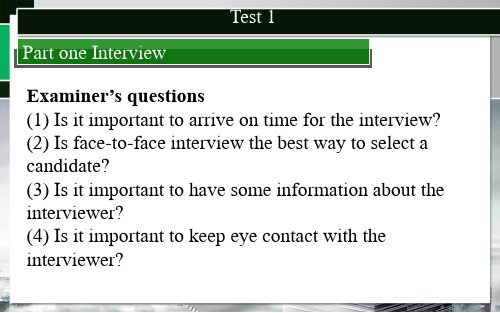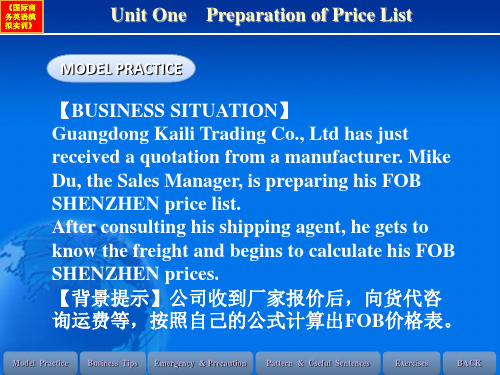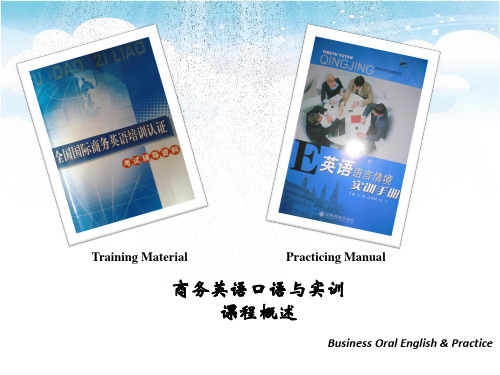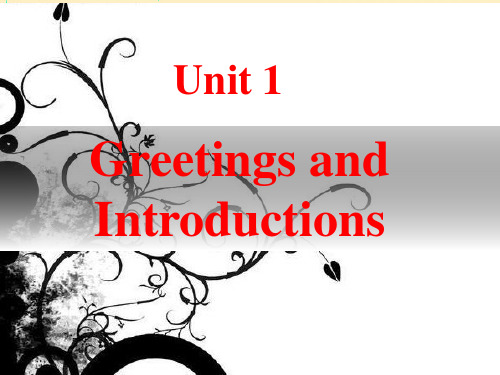国际商务英语口语实训Module 1 Introduction and Greetings
合集下载
国际商务英语口语实训ppt课件

(4) Yes. Having eye contact shows your respectfulness and confidence.
Test 1
Part Two Mini-presentation
Direction: In this part of the test, you are asked to make a short presentation on the topic for about a minute. You will have a minute to prepare this. Topic: What is important when preparing for an interview? ● Studying the job advertisement ● Finding out about the company ● Preparing yourself psychologically
(2) I suppose so. To see the candidate in person will to some extent help the interviewer to know the candidate's personality.
(3) Yes, indeed. If you learn the name and title of the person you'll be meeting with, you can be sure about the waest 1
Part Three: Collaborative task and discussion
Follow-up questions (1) Yes. Don't be afraid to disagree with your interviewer in an agreeable way. If you don't disagree at times, you become, in effect, a "yes" man or woman. (2) No. The interviewer might infer that you are only interested in your own needs and not those of their company. Wait until the interviewer raises the subject.
Test 1
Part Two Mini-presentation
Direction: In this part of the test, you are asked to make a short presentation on the topic for about a minute. You will have a minute to prepare this. Topic: What is important when preparing for an interview? ● Studying the job advertisement ● Finding out about the company ● Preparing yourself psychologically
(2) I suppose so. To see the candidate in person will to some extent help the interviewer to know the candidate's personality.
(3) Yes, indeed. If you learn the name and title of the person you'll be meeting with, you can be sure about the waest 1
Part Three: Collaborative task and discussion
Follow-up questions (1) Yes. Don't be afraid to disagree with your interviewer in an agreeable way. If you don't disagree at times, you become, in effect, a "yes" man or woman. (2) No. The interviewer might infer that you are only interested in your own needs and not those of their company. Wait until the interviewer raises the subject.
新编文档-国际商务英语模拟实训教程Unit1 Preparation of Price List-精品文档

Model Practice Business Tips Emergency & Precaution Pattern & Useful Sentences
Exercises
BACK
国《际国商际务商 英务语英模语拟模 实拟训实训》
Unit One Preparation of Price List
依然以BU此SI为NE例SS:T客IPS户要购买产品A300, 业务员向工厂询价,工 厂报价为10元/只。A300的外箱规格为80 CM×60 CM×40CM
, 53每30箱元1装.人柜1民0型0币只、,。体预公期积司利与按润一材为只积54%0尺,高按柜照6报.5价的,汇货率代,报计总算运出费FO为B 深圳的2单. C价B。M、CUFT的转换
公式说明: 6)假设利润率为5%,计算公式为1+1×5%=1.05
Model Practice Business Tips Emergency & Precaution Pattern & Useful Sentences
Exercises
BACK
国《际国商际务商 英务语英模语拟模 实拟训实训》
Unit One Preparation of Price List
例如:BU客SI户NE要SS购T买IPS产品A300, 业务员向工厂询价,工厂报价为 10元/只。A300的外箱规格为80 CM×60 CM×40CM,每箱装
1民0币0只,1。预. 公柜期司型利按润、一为体只5积%40与,尺按材高照柜积6报.5价的,汇货率代,报计总算运出费FO为B5深33圳0元的人单 价。 2. CBM、CUFT的转换
Model Practice Business Tips Emergency & Precaution Pattern & Useful Sentences
Introduction and Greeting

…
Business Oral English & Practice
Chapter 1 -- Expression
1. Introducing yourself
2) Meeting and greeting people whom seem to have been met before. --Haven’t we met before? --You know, you look really familiar. --I think we are in the same reception /Boao Asian Forum. --No, I don’t think so. I think you have the wrong person. …
Business Oral English & Practice
Chapter 1-- Lead in
What would you say if you want to introduce yourself ? What would you say if you want to introduce others ?
Contents
Listening Speaking Language Reading Writing Interpreting Business
Business Affairs Business ttes
International Marketing
International Trade Others
3. Getting the name right
--Sorry, what’s your name again? --Sorry, what’s your first name? --Sorry, I didn’t quite catch your last name. Would you please say it again? --I beg your pardon.
高等教育出版社 商务英语基础上 陆梦青主编 unit one

customΒιβλιοθήκη [ 'kʌstəm ] n. 习惯,风俗;海关
Guessing Game
Business Reading
[ ri'kwest ] v. 要求
request approach
[ ə'prəutʃ ] v. 走进,靠近
attract
[ ə'trækt ] v. 吸引
respond
[ ris'pɒnd ] v. 回答
Situation 2: Louise Scott,
female, General Manager of your company.Mike Johnson, male, VIP of your company, sales manager of SWQ Ltd.
Business Reading
1. Why should we pay more attention to the introductions? 2. What are the basic rules in business introductions? 3. What should you do to respond to the introduction properly?
Listening
Task Two: Listen to the dialogue again and fill in
the missing words.
Jean: Mr Lee, May I introduce the customer from ABC Company, Mr. Bob?
And Mr Bob, this is our __b_o_s_s__ , Mr Lee. Lee: How do you do, Mr. Bob? I’m very glad to __m_e_e_t__ you. Bob: How do you do, Mr Lee? Glad to meet you,too. Lee: My secretary has told me a ___lo_t___ about you. Bob: Oh, I’ve often heard of you in _b__u_si_n_e_s_s_ and I’ve been
商务英语Unit 1 Introductions and greetings

Unit One Introductions and greetings
本单元重点是学习如何介绍自己和他人;相互确认姓 名;了解对方是哪里人以及介绍自己来自何方。语法 重点是动词to be的一般现在时的用法。
Lesson One Introducing Yourself 文化背景与常用语
Lesson One Introducing Yourself
★和别人分手道别,通常说: Goodbye.还可以写成Good-bye。 Bye-bye. Bye. 这是最随便的道别用语。 See you later. 回头见。 So long. 在正式的场合不用;道别以后一时 不见面时也不用。 Take care. 保重,当心。
★和新朋友道别时,还可以说: Nice to have met you. 很高兴认识了您。 Hope to see you again. 希望再次见到您。
C 句子中的重要词通常需要重读。这些关键词 可以是名词、动词、形容词、副词、数词、 指示代词和疑问代词。其它词,如助动词、 人称代词、连词、冠词以及介词一般不重读。
Lesson Three Introducing Other People
介绍给 年老的,把地位低的介绍给地位高的,把男 士介绍给女士。经常使用的介绍用语有: I'd like to introduce my friend … I'd like you to meet … May I introduce you to our manager…? Let me introduce you to our manager… Allow me to introduce my friend… Do you know…? Have you met…? This is…
本单元重点是学习如何介绍自己和他人;相互确认姓 名;了解对方是哪里人以及介绍自己来自何方。语法 重点是动词to be的一般现在时的用法。
Lesson One Introducing Yourself 文化背景与常用语
Lesson One Introducing Yourself
★和别人分手道别,通常说: Goodbye.还可以写成Good-bye。 Bye-bye. Bye. 这是最随便的道别用语。 See you later. 回头见。 So long. 在正式的场合不用;道别以后一时 不见面时也不用。 Take care. 保重,当心。
★和新朋友道别时,还可以说: Nice to have met you. 很高兴认识了您。 Hope to see you again. 希望再次见到您。
C 句子中的重要词通常需要重读。这些关键词 可以是名词、动词、形容词、副词、数词、 指示代词和疑问代词。其它词,如助动词、 人称代词、连词、冠词以及介词一般不重读。
Lesson Three Introducing Other People
介绍给 年老的,把地位低的介绍给地位高的,把男 士介绍给女士。经常使用的介绍用语有: I'd like to introduce my friend … I'd like you to meet … May I introduce you to our manager…? Let me introduce you to our manager… Allow me to introduce my friend… Do you know…? Have you met…? This is…
商务英语口语实训 (1)

Part Two Situational Dialogues Dialogue 1
draft tract 合同草案
• draft a contract 起草合同
• Please go through the draft contract and make sure everything is all right.
take up 开始;开始从事
• He took up writing after graduation. • 毕业后他开始从事写作。 • to take up swimming • 开始学游泳 • He did not particularly want to take up a
competitive sport. • 他并没有特别想要开始从事竞技性运动项
pay when she collected the computer. • 她本可以明确要求取电脑时付款的。
terms of payment 付款条件
• Now we have settled the terms of payment.
• 现在我们已经谈妥了付款条件。 • Our terms of payment is confirmed and
Part Two Situational Dialogues Dialogue 3
Key to the Question in Warm-up
• Generally speaking, a negotiation team consists of negotiating leaders(谈判领导人 员), technicians (技术人员), businessmen( 商务人员), legal advisers (法律顾问), accountants (财务人员,会计), and interpreter(翻译人员).
商务英语工作项目实训(第三版)教学课件UNIT 1

12
II. Background Knowledge
4. Greetings in Business Tips
• Introduce yourself with name and title. • Shake hands. • Express happiness to meet the other person. • Give or accept directions.
Tips
• Stand near a person and say hello. • Express happiness to see a person. • Ask a question or begin a conversation.
6
II. Background Knowledge
2. Greetings before a Conversation
3. Greetings in the Classroom Pair Practice
A: Hello. I'm Sasha. B: Hi Sasha. I'm Brent. (Hold out hand to shake) A: Nice to meet you Brent. Where are you from? B: Chicago, Illinois. And you? A: I'm from Australia. I live in a small town near Sydney. B: Australia. Wow. I've always wanted to go there. How long have you been in Canada? A: I just arrived this week. It's my first day of school. B: Really? I think you'll love Vancouver. It's not too hot and not too cold.
II. Background Knowledge
4. Greetings in Business Tips
• Introduce yourself with name and title. • Shake hands. • Express happiness to meet the other person. • Give or accept directions.
Tips
• Stand near a person and say hello. • Express happiness to see a person. • Ask a question or begin a conversation.
6
II. Background Knowledge
2. Greetings before a Conversation
3. Greetings in the Classroom Pair Practice
A: Hello. I'm Sasha. B: Hi Sasha. I'm Brent. (Hold out hand to shake) A: Nice to meet you Brent. Where are you from? B: Chicago, Illinois. And you? A: I'm from Australia. I live in a small town near Sydney. B: Australia. Wow. I've always wanted to go there. How long have you been in Canada? A: I just arrived this week. It's my first day of school. B: Really? I think you'll love Vancouver. It's not too hot and not too cold.
剑桥商务英语教程Unit1 introductions and greeting

3. My favorite subject is _______ because ___________ .
What do people do in different countries?
In Thailand,people greet each other by putting their hands together and bowHionwg sdloigthhtelyy. greet each other?
1. introduce oneself 自我介绍 2. introduce A to B 把A介绍给B
Introduction Response
My name is … Pleased to meet you.
I am…
How do you do?
Self-introduction 模板
1. My name is_________ . I graduated from _______ junior high school. There are ________ people in my family. ______________.
How are you? -- Pretty good. -- Fine, thank you. -- Nothing much. / Nothing special.
When Dutch people meet, they kiss each other on one cheek and then the other. If you are a close friend or relative, then you get three kisses!
In Dutch
Hello Hi / hey What’s up? What’s good? How is it going?
What do people do in different countries?
In Thailand,people greet each other by putting their hands together and bowHionwg sdloigthhtelyy. greet each other?
1. introduce oneself 自我介绍 2. introduce A to B 把A介绍给B
Introduction Response
My name is … Pleased to meet you.
I am…
How do you do?
Self-introduction 模板
1. My name is_________ . I graduated from _______ junior high school. There are ________ people in my family. ______________.
How are you? -- Pretty good. -- Fine, thank you. -- Nothing much. / Nothing special.
When Dutch people meet, they kiss each other on one cheek and then the other. If you are a close friend or relative, then you get three kisses!
In Dutch
Hello Hi / hey What’s up? What’s good? How is it going?
- 1、下载文档前请自行甄别文档内容的完整性,平台不提供额外的编辑、内容补充、找答案等附加服务。
- 2、"仅部分预览"的文档,不可在线预览部分如存在完整性等问题,可反馈申请退款(可完整预览的文档不适用该条件!)。
- 3、如文档侵犯您的权益,请联系客服反馈,我们会尽快为您处理(人工客服工作时间:9:00-18:30)。
Reading in
A. Relevant sentences at first meeting Welcome to our company, Dick. Excuse me, are you Mr. John Smith from ABC Company? You must be Professor Huang from Harvard University. Excuse me, but would you perhaps be Mrs. Hansen? Excuse me, I am looking for Miss David. I am sorry. You have got the wrong person.
Module 1 Introduction and Greetings
Give trust, and you’ll get it double in return. --Kees Kamies
The world is but a little place, after all.
Module 1 Introduction and Greetings
Module 1 Introduction and Greetings
Background Information
In this module, different examples and useful expressions are offered to you so as to help you gain a full and better understanding about various skills and musts in three different modules.
Module 1.1 Introducing & Greeting Warming up
Pair Work B Work in pairs. Ask your partner how to meet, greet and introduce each other properly.
Module 1.1 Introducing & Greeting
Background Information
She or he might spend a long time on gaining media background or training in order to better understand how the media and advertising work. Organizational and planning skills are also important in this field. In order to be a professional person, you need to sharpen your ability of how to speak effectively, how to act politely and properly in introducing and greeting your friends, talking with someone and seeing off friends.
Module 1.1 Introducing & Greeting
Reading in
C. Sentences for self-introduction and introduction Before we start (First of all), let me introduce myself. Mr. Bellman, allow me to introduce myself. My name is Lee Chen,
manager of International Trade Department. Hello, may I introduce myself? I’d like to introduce myself first. Could you please introduce me to your manager? This is Miss Lee Chen. She is in charge of reception and secretarial
Module 1 Introduction and Greetings
Background Information
Do not attempt to address a stranger by title. It is always better to say “Excuse me” to get someone’s attention. In this way you will never use the wrong title and he or she will not be offended. On the other hand, foreigners always feel confused about Chinese names. They usually can not distinguish the given name from the family name. Therefore, when introducing yourself to a foreigner, you may state clearly how you wish to be called. Xiao Li or Mr. Li or you may simply tell him or her, “Please call me….”.
Module 1.1 Introducing & Greeting
Reading in
B. Sentences for meeting again Hi, long time no see, Dick. Do you remember me? So glad/pleased to see you again. How are you? How is your project going? Hello, Jack. Haven’t seen you for ages. How’s everything going? What brings you here? How are things going in your company? Not bad. How is your family? Only if I could have met you earlier!
国际商务英语口语实训Module 1 Introduction and Greection and Greetings Module 1.1 Introducing & Greeting Module 1.2 Chatting Module 1.3 Seeing off Your Friends
Module 1 Introduction and Greetings
Background Information
What’s more, generally speaking, first name and surname are considered to be the most friendly. Never give yourself the title of Mr. as the rules of etiquette preclude this. However, it is acceptable for a woman to use Mrs., Miss and Ms. Addressing a person by his or her given name such as “Tim”, “Mary” is appropriate between family members, friends or in informal situations. Note that secretaries are usually addressed and referred to also by their given names.
Module 1 Introduction and Greetings
Background Information
At the very beginning of the business relationship establishment, greetings play a vital role since they are regarded as one of the most important ways to be friendly to others. When greeting others, one should look at him or her in the face keep smiling and listening attentively. When it comes to introduction, one should cling to the following principle: introduce the one with low position to the one with high position, the younger one to the older one, and the gentlemen to the ladies.
work of the company. Let me introduce Kate from Australia, our new client.
Module 1.1 Introducing & Greeting
Speaking out
Task 1 Read the model dialogues. Pay attention to the highlighted sentences and then role-play it with your partner. L: Hi, my name’s Lee Chen. J: Hi, Lee. Nice to meet you. My name is Juanita, but everyone calls me Jenny. L: Nice to meet you, Jenny. So, where are you from? J: Well, I was born in Thailand, but we moved to Australia when I was about six years old. How about you, Lee? L: I was born in China, and lived there until I started college in Australia.
A. Relevant sentences at first meeting Welcome to our company, Dick. Excuse me, are you Mr. John Smith from ABC Company? You must be Professor Huang from Harvard University. Excuse me, but would you perhaps be Mrs. Hansen? Excuse me, I am looking for Miss David. I am sorry. You have got the wrong person.
Module 1 Introduction and Greetings
Give trust, and you’ll get it double in return. --Kees Kamies
The world is but a little place, after all.
Module 1 Introduction and Greetings
Module 1 Introduction and Greetings
Background Information
In this module, different examples and useful expressions are offered to you so as to help you gain a full and better understanding about various skills and musts in three different modules.
Module 1.1 Introducing & Greeting Warming up
Pair Work B Work in pairs. Ask your partner how to meet, greet and introduce each other properly.
Module 1.1 Introducing & Greeting
Background Information
She or he might spend a long time on gaining media background or training in order to better understand how the media and advertising work. Organizational and planning skills are also important in this field. In order to be a professional person, you need to sharpen your ability of how to speak effectively, how to act politely and properly in introducing and greeting your friends, talking with someone and seeing off friends.
Module 1.1 Introducing & Greeting
Reading in
C. Sentences for self-introduction and introduction Before we start (First of all), let me introduce myself. Mr. Bellman, allow me to introduce myself. My name is Lee Chen,
manager of International Trade Department. Hello, may I introduce myself? I’d like to introduce myself first. Could you please introduce me to your manager? This is Miss Lee Chen. She is in charge of reception and secretarial
Module 1 Introduction and Greetings
Background Information
Do not attempt to address a stranger by title. It is always better to say “Excuse me” to get someone’s attention. In this way you will never use the wrong title and he or she will not be offended. On the other hand, foreigners always feel confused about Chinese names. They usually can not distinguish the given name from the family name. Therefore, when introducing yourself to a foreigner, you may state clearly how you wish to be called. Xiao Li or Mr. Li or you may simply tell him or her, “Please call me….”.
Module 1.1 Introducing & Greeting
Reading in
B. Sentences for meeting again Hi, long time no see, Dick. Do you remember me? So glad/pleased to see you again. How are you? How is your project going? Hello, Jack. Haven’t seen you for ages. How’s everything going? What brings you here? How are things going in your company? Not bad. How is your family? Only if I could have met you earlier!
国际商务英语口语实训Module 1 Introduction and Greection and Greetings Module 1.1 Introducing & Greeting Module 1.2 Chatting Module 1.3 Seeing off Your Friends
Module 1 Introduction and Greetings
Background Information
What’s more, generally speaking, first name and surname are considered to be the most friendly. Never give yourself the title of Mr. as the rules of etiquette preclude this. However, it is acceptable for a woman to use Mrs., Miss and Ms. Addressing a person by his or her given name such as “Tim”, “Mary” is appropriate between family members, friends or in informal situations. Note that secretaries are usually addressed and referred to also by their given names.
Module 1 Introduction and Greetings
Background Information
At the very beginning of the business relationship establishment, greetings play a vital role since they are regarded as one of the most important ways to be friendly to others. When greeting others, one should look at him or her in the face keep smiling and listening attentively. When it comes to introduction, one should cling to the following principle: introduce the one with low position to the one with high position, the younger one to the older one, and the gentlemen to the ladies.
work of the company. Let me introduce Kate from Australia, our new client.
Module 1.1 Introducing & Greeting
Speaking out
Task 1 Read the model dialogues. Pay attention to the highlighted sentences and then role-play it with your partner. L: Hi, my name’s Lee Chen. J: Hi, Lee. Nice to meet you. My name is Juanita, but everyone calls me Jenny. L: Nice to meet you, Jenny. So, where are you from? J: Well, I was born in Thailand, but we moved to Australia when I was about six years old. How about you, Lee? L: I was born in China, and lived there until I started college in Australia.
